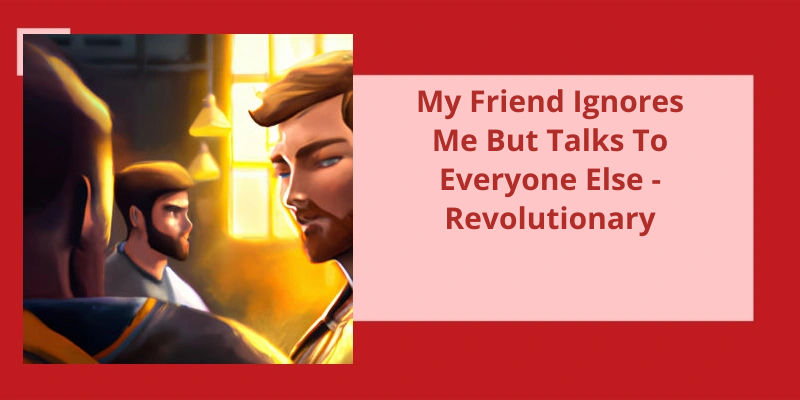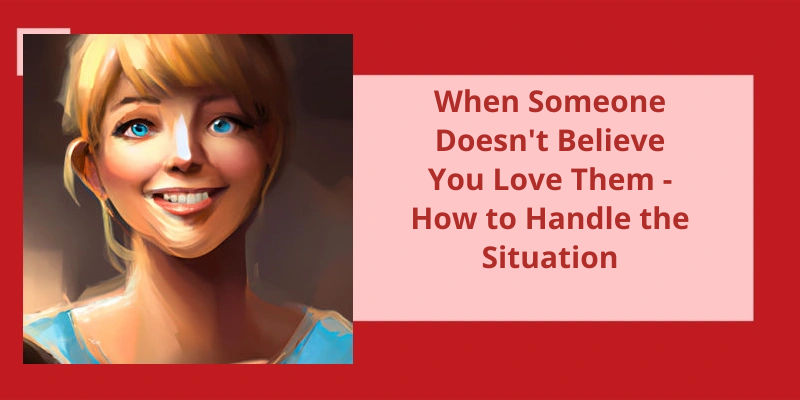Have you ever found yourself in a perplexing situation where your friend seems to have developed a strange habit of completely ignoring you, yet they engage in animated conversations with everyone else? If you have, you aren’t alone in this frustrating predicament. This perplexing phenomenon, which we shall refer to as "My Friend Ignores Me but Talks to Everyone Else," has become an enigma among social circles. Many individuals have attempted to unravel the revolutionary aspects of this peculiar behavior, attempting to understand the underlying causes and potential solutions. Although this phenomenon might initially seem disheartening, it presents a unique opportunity for introspection, fostering personal growth, and the enhancement of interpersonal relationships. By navigating these uncharted waters with an open mind and a compassionate heart, you may discover revolutionary insights that can transform not only your friendship but also your entire perspective on human connections.
What to Do When Your Best Friend Ignores You for No Reason?
When you find yourself in a situation where your best friend is seemingly ignoring you for no apparent reason, it can be quite disheartening. However, it’s important not to immediately assume that their behavior is a personal attack against you. Sometimes, friends distance themselves due to their own personal issues, unrelated to your friendship.
In these situations, it’s crucial to avoid getting defensive. It’s natural to feel hurt, but reacting with defensiveness can exacerbate the situation and put strain on the friendship. Instead, take a step back and give them some space. Allow them time to work through whatever may be causing their distance without pressuring them.
While communication is typically key in maintaining friendships, sometimes talking it out may not be the best approach. Certain individuals may find it difficult to express their feelings or may need time alone to process their emotions. Instead of immediately seeking a conversation, consider finding alternative ways to connect with your friend. This could be through shared hobbies, activities, or experiences that can help rebuild the bond without directly addressing the distance.
It’s important to understand that friendships go through natural ups and downs. It’s possible that your friends behavior may be temporary, and they may come around in time. During this period, it’s essential to let go of any pent-up resentment or frustration and focus on maintaining your own well-being. Dont allow the situation to consume your thoughts or impact your own self-worth.
As difficult as it may be, it’s also crucial to reassess the nature of your friendship. While it’s natural to want to hold onto a close friendship, it’s important to consider whether this friendship is healthy and mutually beneficial. If this behavior becomes a pattern or if it consistently leaves you feeling neglected, it may be necessary to reevaluate whether this friendship is truly worth investing in. Remember, you deserve to have relationships that uplift and support you.
How to Approach Your Friend When They Are Ignoring You
- Start by staying calm and composed.
- Avoid assuming the worst and giving in to negative thoughts.
- Reflect on the situation and try to understand why your friend might be ignoring you.
- Choose an appropriate time and place to talk to your friend.
- Express your concerns and feelings in a non-confrontational manner.
- Listen attentively to their perspective and try to see things from their point of view.
- Avoid being defensive or placing blame during the conversation.
- Show empathy and understanding towards your friend’s feelings.
- Apologize if you’ve done something wrong or hurtful unintentionally.
- Suggest finding a solution or compromise that works for both of you.
- Give your friend some space and time if they need it.
- Continue to reach out and maintain open communication after the conversation.
- Respect your friend’s decision if they need more time to process the situation.
Furthermore, there are various reasons why someone may choose to ignore you, such as being preoccupied, feeling overwhelmed, or experiencing personal issues that divert their attention. Understanding these possibilities can provide insight into the situation and help decide how to address it effectively.
What Does It Mean When Your Talking to Someone and They Ignore You?
When you find yourself in a situation where someone is ignoring you while talking to others, it can be disheartening and confusing. It’s important to remember that there can be various reasons for this behavior. One possibility is that the person simply has a lack of interest in what you’re saying. Perhaps the topic you brought up doesn’t resonate with them or they’ve no personal investment in it. In such cases, it may be helpful to shift the subject to something that they find more engaging or meaningful.
Sometimes, being ignored may not be a deliberate action, but rather a result of distractions or circumstances beyond the persons control. It’s essential to consider their environment or personal situation at the time of the conversation. They might be dealing with stress, fatigue, or other pressing matters that hinder their ability to fully engage with you. In these situations, showing empathy and understanding can go a long way in fostering a more positive and open dialogue.
It could stem from a lack of interest, limited social skills, external distractions, or unresolved conflicts. By considering these factors and adjusting the conversation accordingly, you can work towards reengaging with the person and fostering stronger communication.
The Psychological Effects of Being Ignored: How Does Being Ignored by Others Affect Our Self-Esteem and Mental Wellbeing?
When someone consistently ignores us while giving attention to others, it can have significant psychological effects on our self-esteem and mental wellbeing. Being ignored by a friend, in particular, can be particularly hurtful and can make us question our worth and place in that person’s life.
When we’re ignored, our brain interprets it as a form of rejection, which can trigger feelings of sadness, loneliness, and even anger. It can leave us feeling unimportant, unwanted, and invisible. Over time, this can damage our self-esteem and make us question our own value as individuals.
Moreover, being ignored by a friend while they engage with everyone else can lead to feelings of exclusion and marginalization. It can make us feel isolated, as if we don’t belong or fit in with the group. This can further impact our mental wellbeing, eroding our sense of belonging and social support.
It’s essential to recognize the psychological effects of being ignored and to address them. Communicating openly with our friend about how their behavior makes us feel can help foster understanding and potentially resolve any underlying issues. It’s also important to remember that we’re worthy of attention and belonging, and that the actions of others don’t define our self-worth.
Feeling ignored by a friend when you try to engage in conversation can be disheartening. While the reasons behind their behavior may vary, it could be a sign that they find you uninteresting or are preoccupied with someone else. Although it’s unpleasant, accepting this reality and focusing your attention on those who value your presence might be a healthier approach.
Why Does My Friend Ignore Me When I Talk to Them?
They aren’t worth your time and energy. Don’t chase after someone who consistently ignores you when you try to engage in conversation. Surround yourself with friends who appreciate your presence and value your conversations.
It’s also possible that there may be other underlying reasons for your friends behavior. They could be going through personal issues or facing difficulties that make it difficult for them to engage with others. It may be helpful to approach them in a non-confrontational manner and express your concerns, offering support if they need it.
However, if your friend consistently ignores you while actively engaging with others, it may be necessary to reevaluate the friendship. Healthy relationships require mutual respect and genuine interest in each others lives. If your friend is consistently disregarding your attempts at conversation, it may be a sign that they don’t value your friendship as much as you do.
Remember that friendship is a two-way street. If someone consistently ignores you, it may be a sign that they aren’t interested in maintaining a meaningful connection with you. Focus your energy on building connections with individuals who appreciate and reciprocate your efforts. Surround yourself with people who genuinely enjoy your company and make you feel valued.
If you find yourself in a situation where someone is deliberately ignoring you when you try to talk to them, it’s important to stay calm and approach the situation with maturity. Before jumping to conclusions, consider all possible reasons for their behavior and give them the time and space they may need. It’s also essential to control your emotions and avoid playing games just to seek their attention. Instead, focus on yourself and indulge in self-care activities to maintain your emotional well-being.
What to Do if Someone Ignores You When You Talk to Them?
When someone ignores you, especially when they seem to talk to everyone else around you, it can be incredibly disheartening and frustrating. It’s important to stay cool and composed in these situations, as overreacting may only worsen the problem. Before jumping to conclusions, make sure that the person is intentionally ignoring you and not simply preoccupied with other matters.
Consider all possible reasons for their behavior. It may be that they’re going through a difficult time or have personal issues that are causing them to withdraw. Understanding their perspective can help you approach the situation with empathy and find a resolution.
While it may be tempting to confront the person immediately, it’s often more effective to give them some time and space. People have different ways of coping with stress or emotional turmoil, and sometimes they just need a moment to themselves. By allowing them this space, you show respect for their boundaries and give them the opportunity to address the issue in their own time.
It’s important to control your emotions in these situations. It can be hurtful to be ignored, but letting those emotions dictate your actions may not lead to a positive outcome. Instead, focus on regulating your emotions and seeking support from other friends or loved ones.
Take this time to focus on yourself and engage in activities that bring you joy. Pampering yourself and indulging in self-care can help boost your self-esteem and remind you of your own worth. Surround yourself with positivity and make an effort to engage in activities that make you happy.
While playing games or resorting to attention-seeking behaviors may feel tempting, it’s not a healthy or sustainable solution. Instead, focus on developing genuine connections and nurturing relationships that are healthy and reciprocal. Act with integrity and respect, and let go of relationships that consistently make you feel ignored or undervalued. Remember, you deserve to be treated with kindness and respect.
Source: 11 Things To Do If Someone Is Deliberately Ignoring You
Why Is Ignoring Someone So Powerful?
Focus on your own growth, happiness, and self-improvement. By ignoring someone who ignores you, you shift your energy towards personal development and cultivate a sense of self-worth. This self-centered attention can be liberating, as you no longer rely on external validation, particularly from someone who disregards you.
Ignoring also grants you the power to control the narrative. When you refuse to engage with someone who ignores you, you reclaim the authority over your own emotions. You demonstrate that their behavior doesn’t dictate your self-esteem or emotional well-being. By disconnecting from their actions and words, you break free from their manipulation and regain control over your own narrative.
Moreover, ignoring someone sends a clear message that their actions aren’t acceptable. It can be a form of boundary-setting, highlighting that you refuse to tolerate disrespectful behavior. It asserts your own standards and values, showing that you value your own worth over their acknowledgement or attention.
In addition, ignoring someone can be a catalyst for personal growth. It encourages introspection and self-reflection, as you explore your own reactions and emotions. Through self-discovery, you can identify patterns of behavior or emotional triggers that may contribute to unhealthy relationships. This self-awareness empowers you to make positive changes and engage in more fulfilling connections.
Finally, focusing on yourself allows you to redirect your energy towards building meaningful relationships with others who appreciate and reciprocate your presence. By investing in genuine connections, you surround yourself with individuals who value you as a person. This fosters a supportive network that encourages personal growth, happiness, and fulfillment.
It empowers you to redirect your energy towards your own happiness and development, allowing you to take control of the narrative and set healthy standards. Through self-reflection, you can identify and modify behavior patterns, fostering fulfilling and meaningful relationships with others who value your presence.
The Psychological Effects of Being Ignored
The psychological effects of being ignored can be deeply impactful and distressing. When a friend consistently ignores someone, it can lead to feelings of rejection, isolation, and sadness. Being ignored by a close friend may trigger thoughts of self-doubt and lower self-esteem, making individuals question their worth and value in relationships.
Furthermore, this prolonged neglect can generate a sense of invisibility and insignificance. It may lead to increased anxiety, social withdrawal, and a reluctance to engage with others. Individuals experiencing this may feel confused and wonder what they did wrong, as they watch their friend effortlessly connect with everyone else.
It’s important to recognize that being ignored isn’t a reflection of one’s own shortcomings or worth. There are various reasons why someone may choose to ignore another person, such as personal issues, jealousy, or misunderstanding. In such situations, it can be helpful to communicate openly and honestly with the friend to address the issue and seek resolution.
However, it’s also crucial to prioritize one’s own well-being. If the friend continues to ignore and disregard the individual’s feelings, it might be necessary to reevaluate the friendship and consider healthier relationships that foster mutual respect, support, and inclusivity.
When someone ignores us, it can have a profound effect on our emotions and mental well-being. It can trigger feelings of self-doubt and question our worthiness of attention. Additionally, being ignored can make us feel like we lack control in the situation, leading to frustration and unease. In order to navigate these tense relationships, it’s essential to understand and employ appropriate responses that can help maintain a sense of peace and understanding.
What Does It Do to You When Someone Ignores You?
Being ignored by someone, especially a friend, can have a profound impact on our emotional well-being. It can result in feelings of self-doubt, as we start questioning our worth and value in that persons eyes. We may begin to wonder if we’ve done something wrong or if there’s something inherently unlikable about us. This self-doubt can start to erode our self-esteem, causing us to question ourselves and our abilities.
Additionally, being ignored can make us feel a lack of control in the situation. We may feel like we’ve no say or influence over how this person perceives and treats us. It can be frustrating and disheartening to see this person engage with others while actively ignoring us. It makes us question why we’re being disregarded and what we can do to change the situation.
Feeling ignored can also create a sense of isolation and loneliness. It reminds us that we aren’t being included or valued by someone who we considered a friend. This can lead to feelings of sadness and longing for connection. We may start to question the authenticity of the friendship and wonder if it was ever as meaningful as we believed it to be.
Knowing how to respond to someone who ignores us is essential in managing tense relationships. It’s important to approach the situation with empathy and understanding, as there may be reasons beyond our control for their behavior. Communicating openly and honestly can help address any underlying issues and potentially rebuild the relationship.
However, it’s equally important to recognize that we can’t control how others choose to treat us. Learning to prioritize our own well-being and surround ourselves with people who appreciate and value us is crucial. It may be necessary to distance ourselves from someone who consistently ignores us, as continually seeking validation from someone who refuses to acknowledge our presence can be harmful to our self-esteem.
Conclusion
In conclusion, navigating the complexities of human relationships can be both challenging and mystifying. While it may be disheartening to experience the sensation of being ignored by a friend who seems to engage effortlessly with others, it’s crucial to approach such situations with understanding and empathy. Rather than jumping to conclusions or harboring resentment, it’s important to recognize that interpersonal dynamics are multifaceted and influenced by a myriad of factors. Maintaining open and honest communication, setting boundaries, and fostering a sense of self-worth can serve as powerful tools in revolutionizing these relationships. By prioritizing our own emotional well-being and approaching these instances with grace, we can navigate the intricacies of friendship and ultimately foster healthier connections with those around us.






